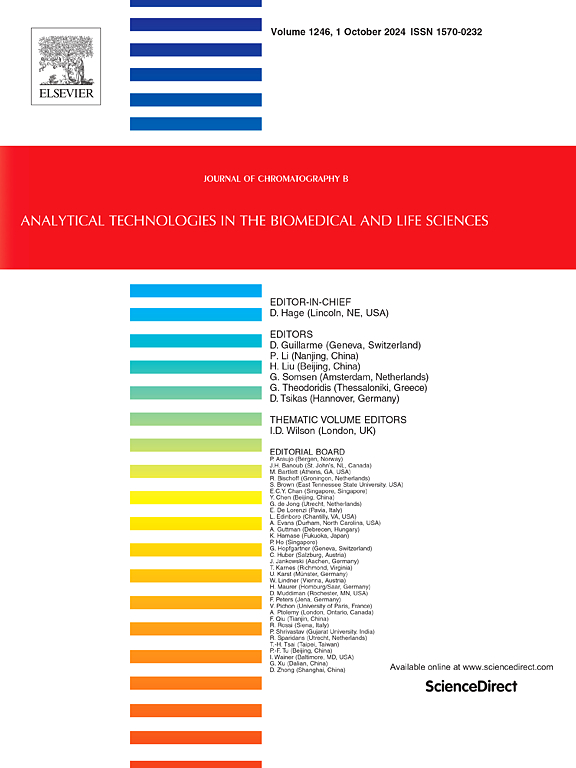C-18吸附剂固相萃取法从血浆中回收异种生物制剂——文献差异的原因。
IF 2.8
3区 医学
Q2 BIOCHEMICAL RESEARCH METHODS
引用次数: 0
摘要
固相萃取(SPE)是最常用的血浆样品制备方法之一。结果表明,C18吸附剂固相萃取对血浆样品中异种生物制剂的回收率很大程度上取决于其储存时间和温度。虽然在最佳的固相萃取条件下,从新鲜血浆样品中可以100%分离和回收外源药物,但从储存血浆中其固相萃取回收率较低。它随着等离子体储存时间的增加和温度的降低而减小。此外,在SPE-C18柱上装载检测样品时,储存的血浆样品中的部分异种菌根本没有被吸附,而是与废物一起留下。根据核磁共振数据,SPE柱加载过程中废液中存在异种生物的主要原因是等离子体在贮存过程中发生的结构化学变化,导致与异种生物形成了一些亲水的络合物。从储存的血浆中提取外生菌的SPE回收率较低的另一个原因是血浆沉积物的形成,它结合/闭塞了外生菌。提出的结果扩展了目前关于为什么文献中报道的血浆中异种抗生素的SPE恢复程度可能不同的知识。它们对于色谱系统在血浆中异种生物分析中的正确校准以及在异种生物估计中实现SPE分析过程的高精度具有重要意义。本文章由计算机程序翻译,如有差异,请以英文原文为准。
Xenobiotics recovery from plasma using solid phase extraction with C-18 sorbent – The reasons of literature discrepancies
Solid phase extraction (SPE) is one of the most popular methods of preparing plasma samples before determining the xenobiotics they contain. The present paper shows that the recovery degree of xenobiotics from plasma samples using SPE with C18 sorbent strongly depends on their storage time and temperature. While xenobiotics can be isolated and recovered in 100 % from fresh plasma samples under optimal conditions of the SPE procedure, their SPE recovery degree from stored plasma is lower. It diminishes with the time increase and temperature reduction of plasma storage. Moreover, a part of xenobiotic in stored plasma samples is not sorbed on SPE-C18 column at all and leaves it together with the waste during loading the column with the examined sample. According to the NMR data, the main reason of the presence of xenobiotics in the waste of the SPE column during its loading are structural-chemical changes occurring in plasma during its storage, leading to the formation of some complex(es) of hydrophilic character with xenobiotic. Another reason for lower SPE recovery degree of xenobiotic from stored plasma is the formation of plasma sediment, which binds/occludes xenobiotic. The presented results expand the current knowledge on why the SPE recovery degree of xenobiotics from plasma reported in the literature may differ. They are important for proper calibration of the chromatographic system in the analysis of xenobiotics in plasma and for achieving high accuracy of the analytical procedure involving SPE in xenobiotic estimation.
求助全文
通过发布文献求助,成功后即可免费获取论文全文。
去求助
来源期刊

Journal of Chromatography B
医学-分析化学
CiteScore
5.60
自引率
3.30%
发文量
306
审稿时长
44 days
期刊介绍:
The Journal of Chromatography B publishes papers on developments in separation science relevant to biology and biomedical research including both fundamental advances and applications. Analytical techniques which may be considered include the various facets of chromatography, electrophoresis and related methods, affinity and immunoaffinity-based methodologies, hyphenated and other multi-dimensional techniques, and microanalytical approaches. The journal also considers articles reporting developments in sample preparation, detection techniques including mass spectrometry, and data handling and analysis.
Developments related to preparative separations for the isolation and purification of components of biological systems may be published, including chromatographic and electrophoretic methods, affinity separations, field flow fractionation and other preparative approaches.
Applications to the analysis of biological systems and samples will be considered when the analytical science contains a significant element of novelty, e.g. a new approach to the separation of a compound, novel combination of analytical techniques, or significantly improved analytical performance.
 求助内容:
求助内容: 应助结果提醒方式:
应助结果提醒方式:


